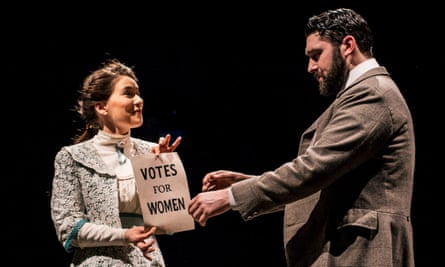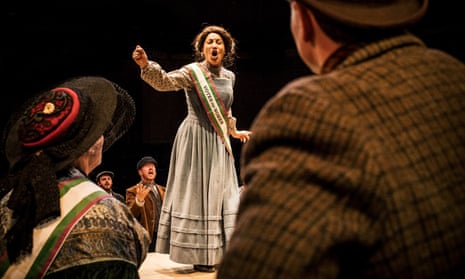Elizabeth Robins should be better known than she is. An American actor and writer, she moved to England to restart her life after the death of her husband. In London, she was admired both for her talent and her refusal to wait for good parts to come to her: she and a friend – both passionate about Ibsen – decided to put on Hedda Gabler; Robins was the first woman to play the title role in Britain. A friend of Oscar Wilde and George Bernard Shaw, she began writing when she saw that acting might not provide a consistent enough income on which to survive.
She became a successful writer of fiction and non-fiction, including a novel, The Convert, which was published in 1907 and traces a story with similarities to Robins’ own political awakening. She used the same story for a play (produced in the same year as The Convert, under the less apologetic title, Votes for Women), which has now been adapted and directed for the New Vic by Theresa Heskins. The protagonist, Jean, is a young woman who begins to question why women’s suffrage is not yet in place, and finds herself dazzled by Christabel Pankhurst and Annie Kenney when she goes to Trafalgar Square to hear them speak.
Heskins has added a prologue and epilogue to her timely revival. (Robins had little gift for a dramatic conclusion, as is proven when the play almost stumbles into its interval.) The prologue creates a curiously undramatic opening: the women stand isolated above us, listening to the debate in parliament on 25 April 1906, which was filibustered so that no vote on extending suffrage could take place. But as the scene melts away to the shouted slogan “Deeds not words”, the absence of initial fireworks is forgiven. The frustrating lack of action parallels exactly what the suffragists experienced.

The first act takes place in a drawing room full of bright young people and their concerned aunts, with Rebecca Brewer portraying Mrs Freddy Tunbridge, a punchy woman who wants the vote even as her elders deplore the notion (Anna Kirke is a picture of pinch-mouthed censoriousness). Jean (a powerfully sincere Lowri Izzard) is drawn to the views of another guest, Vida Levering. Polly Lister invests Vida with a convincing charisma: no wonder women (and men) are drawn to her.
As politically passionate characters debate with one another, the second act is reminiscent of Shaw. (As Heskins points out in the programme, he acted as Robins’ dramaturge.) Vida finally reveals her secret to Jean, which draws an unexpected connection between them. The dialogue then really starts to ping. In a line that could have come straight from the MeToo movement, Vida fixes her target with a gimlet eye, telling him, “You can’t kill this new spirit that is among women.”
The play doesn’t have the wit of Wilde (although it provokes the odd ripple, as when Jean tells Vida’s incensed ex, “She hasn’t mentioned you,” and he looks utterly bewildered at the idea). But it has a warmth and a sincerity which matter. The epilogue reminds us that it would be 11 years, and a war, before some women got the vote. And yet, as Jean observes, “I can’t believe women are so helpless when I see great men so afraid of them.”
- At the New Vic theatre, Newcastle-under-Lyme, until 24 March. Box office: 01782 717962.

Comments (…)
Sign in or create your Guardian account to join the discussion